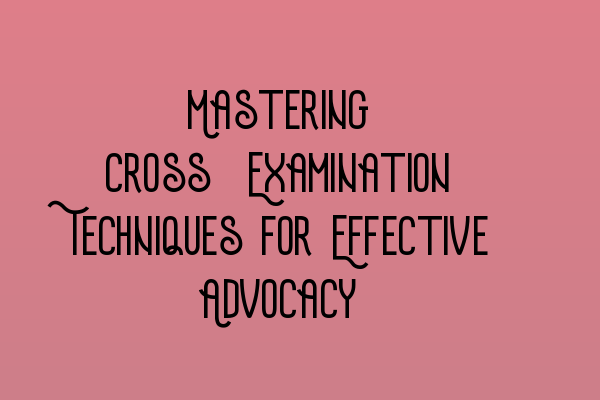Mastering Cross-Examination Techniques for Effective Advocacy
When it comes to criminal law practice, mastering the art of cross-examination is crucial for effective advocacy. Cross-examination, as defined by the Solicitors Qualifying Exam (SQE), is the process of questioning a witness from the opposing party to challenge their testimony and credibility. It is a powerful tool that can either support or undermine your case, depending on how skillfully it is executed.
Effective cross-examination techniques can help you uncover hidden facts, expose inconsistencies, and ultimately strengthen your position in court. In this blog post, we will explore some key strategies to help you master cross-examination and enhance your advocacy skills.
1. Prepare Thoroughly
Like any aspect of legal practice, preparation is key to successful cross-examination. Start by thoroughly understanding the facts of your case, including the evidence presented by both parties. Identify the weaknesses in the witness’s testimony and the areas where you can potentially challenge their credibility.
One effective way to prepare is to create a detailed outline or script for your cross-examination. Anticipate the possible responses from the witness and formulate strategic follow-up questions. By having a well-prepared plan, you can confidently navigate the cross-examination process.
If you need additional resources to aid your preparation, consider utilizing practice exam questions and mock exams provided by SQE 1 Preparation Courses. These resources can help you simulate real-life situations and develop your cross-examination skills.
2. Establish Control
During cross-examination, it is essential to establish control over the witness. By taking control, you can steer the direction of the questioning and prevent the witness from diverting attention away from your intended line of inquiry.
Achieving control can be done through various techniques, such as maintaining a confident and assertive demeanor, using leading questions, and cutting off the witness if they are being evasive. Remember to stay composed and in control, as this will have a significant impact on the perception of the judge and jury.
3. Use Open-Ended Questions
As a skilled advocate, your goal is to extract as much information as possible during cross-examination. Open-ended questions are an effective way to achieve this. By phrasing your questions in a way that requires more than a simple “yes” or “no” answer, you can elicit valuable details from the witness.
For instance, instead of asking, “Did you see the defendant near the crime scene?” you can ask, “Can you describe what the defendant was doing at the time you saw them near the crime scene?” This type of question encourages the witness to provide more detailed and descriptive answers, allowing you to gain a deeper understanding of the situation.
4. Listen Carefully and React
Active listening is a vital skill during cross-examination. In addition to focusing on the witness’s answers, pay attention to their body language, tone of voice, and any inconsistencies in their testimony. These non-verbal cues can reveal important clues about their credibility.
Reacting promptly to the witness’s responses is equally important. If the witness contradicts themselves or provides inconsistent information, be prepared to point it out. By highlighting these discrepancies, you can showcase the weaknesses in their testimony and cast doubt on their credibility.
5. Maintain Professionalism
Throughout the cross-examination process, it is crucial to maintain professionalism and avoid personal attacks or aggressive behavior. While it may be tempting to attack the witness personally, this approach can undermine your credibility and damage your case.
Instead, focus on challenging the witness’s testimony through logical and evidentiary means. Build rapport with the jury and maintain a respectful tone throughout your questioning. By exhibiting professionalism, you enhance your credibility as an advocate and increase the likelihood of persuading the judge and jury.
If you’re looking for further support with your SQE preparation, consider exploring SQE 2 Preparation Courses. These courses are designed to equip you with the necessary knowledge and skills to excel in the SQE exams.
In Conclusion
Mastering cross-examination techniques is a crucial aspect of effective advocacy in criminal law practice. By preparing thoroughly, establishing control, using open-ended questions, listening actively, and maintaining professionalism, you can enhance your cross-examination skills and strengthen your position in court.
Remember, practice makes perfect, so make use of SQE 1 Practice Exam Questions and SQE 1 Practice Mocks FLK1 FLK2 to sharpen your cross-examination abilities. With dedication and practice, you can become a skilled advocate who confidently navigates the intricacies of cross-examination and achieves favorable outcomes for your clients.
Stay tuned for more valuable insights and tips on criminal law practice at SQE Criminal Law & Practice Law UK!
